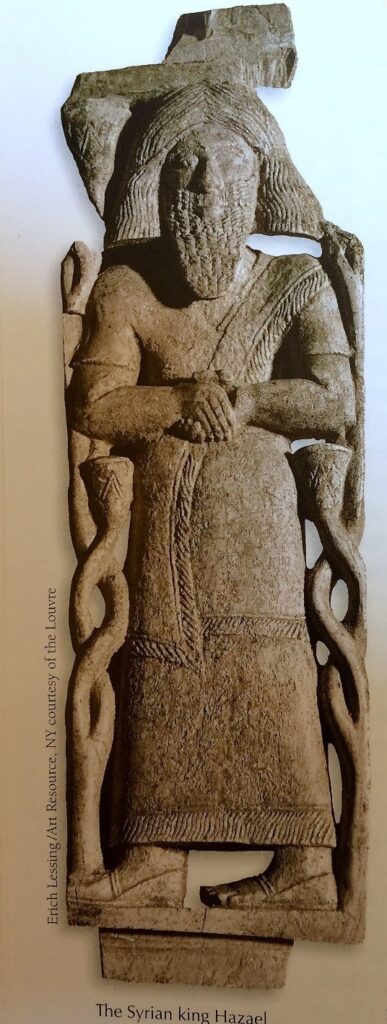The Importance of Prophets – Part 5

In the previous parts of this study, we have taken an interesting look at the basic importance of the biblical prophets and identified the ‘who’ and ‘what’ of both the major and minor prophets of the Bible. In Parts One and Two, we focused on the three ‘major’ prophets, Isaiah, Jeremiah, and Ezekiel, before turning our attention to the ‘minor’ prophets in Parts Three and Four.
In this fifth part of the series, we continue our focus on the ‘minor’ prophets and the role they played in the Word…
‘Minor’ Prophets of the Old Testament:
As we discovered in Part One of this series, there are—according to some sources—two classifications of Old Testament prophets.
One classification being ‘major’ prophets: commonly consisting of three prophets—some sources include Daniel as a fourth—who have the largest prophetic texts and written oracles pertaining to future events, such as the destruction and recreation of Israel, and the coming of Messiah. These ‘major’ prophets include: Isaiah, who we examined in Part One, and Jeremiah and Ezekiel in Part Two.
The second classification is ‘minor’ prophets: those who did not write extensive texts and oracles but were still chosen and valued of God. These prophets include: Hosea, Joel, Amos, Obadiah, Jonah, Micah, Nahum, Habakkuk, Zephaniah, Haggai, Zechariah, and Malachi. In Part Three and Part Four we examined Hosea, Amos, and Jonah.
Finally, while the majority of Old Testament prophets fall into these two categories, there are some, such as, Elijah, Elisha, Samuel, Nathan, and occasionally, Daniel, who are not categorized as either ‘major’ or ‘minor’ prophets despite their biblical and prophetic importance. These prophets we will simply categorize as ‘Old Testament Prophets.’
Joel:
The prophet Joel prophesied of the hard times to come in the Kingdom of Judah’s near future, yet, he also prophesied of things that, to this day, have not yet come to pass—such as, The Day of the Lord!
| Prophets | Kings | Years (B.C.) |
| Joel | Joash
(also known as Jehoash) |
835-796
(biblical and historical years of reign have slight discrepancies, Joash reigned 40 years according to biblical texts) |
Yet, to understand Joel we must begin with the king he prophesied to…
King Joash—put in the place of kingship at the mere age of seven by the Temple priest, Jehoiada, his captains and escorts—was guided by the priest Jehoiada in the ways of God. Yet, while Joash saw to it that the Temple of God was repaired, the high places of false god’s were not completely torn down, nor was their incense stopped. Because of the failure of both king and priest to put an end to this idolatry, when Jehoiada was no longer there to guide Joash, the king easily fell to the dictates of ungodly practices.
“Now after the death of Jehoiada the leaders of Judah came and bowed down to the king. And the king listened to them. Therefore they left the house of the Lord God of their fathers, and served wooden images and idols; and wrath came upon Judah and Jerusalem because of their trespass. Yet He sent prophets to them, to bring them back to the Lord; and they testified against them, but they would not listen.”—2 Chronicles 24:17-19
With Joash turning from God, the importance of the word of the prophet Joel were ever more important. Yet, as was the case with many prophets of God, the king to which he was sent would not obey the word of the Lord. When faced with a possible attack on Jerusalem by the Syrian king, Hazael, Joash took gold from the treasuries of the house of the Lord to use as a bribe to the Syrian king. Joash turned to follow false gods as he listened to the voices of the corrupt leaders, and even had Zechariah (the son of Jehoiada, the man who had enthroned and guided him), stoned for trying to return the people to God! Therefore, the evil at the end of his days overtook the good and Joash died a wicked king.
Yet, Joash had many chances to return and repent, for Joel prophesied not only of the dark days to come, but of God’s willingness to forgive should His people but return to Him…
“‘Now, therefore,’ says the Lord, ‘Turn to Me with all your heart,
with fasting, with weeping, and with mourning.’
So rend your heart, and not your garments;
return to the Lord your God, for He is gracious and merciful,
slow to anger, and of great kindness;
and He relents from doing harm.”—Joel 2:12-13
Even though Joash failed to listen to the prophecies of the prophet Joel, they still remain important to this day. For while many of Joel’s prophecies spoke of close coming events and of the Lord’s desire to forgive, certain of his prophecies have yet to come to pass—the most important being Joel’s prophecy of the final coming of God, The Day of the Lord!
“Blow the trumpet in Zion, and sound an alarm in My holy mountain!
Let all the inhabitants of the land tremble;
for the day of the Lord is coming, for it is at hand…”—Joel 2:1
Yet, even in our lifetime, Joel’s prophecies are coming to pass. For while Joel spoke of things finished and the final things to come, he also spoke of things very near; many occurring THIS day!
“And it shall come to pass afterward that I will pour out My Spirit on all flesh;
your sons and your daughters shall prophesy, your old men shall dream dreams,
your young men shall see visions…
“And I will show wonders in the heavens and in the earth:
blood and fire and pillars of smoke.
The sun shall be turned into darkness, and the moon into blood,
before the coming of the great and awesome day of the Lord.”—Joel 2:28, 30-31

(Source: The Louvre. Ivory carving of Syrian king Hazael mentioned in the Bible; his life corresponds with the timeframe of the prophets Joel and Elisha.)
Obadiah:
The book of Obadiah is the shortest prophetic book of the Bible, as well as the shortest book in the Old Testament, consisting of one chapter with twenty-one verses. Very little is known of the prophet outside of this short book, as there is too little information within the book itself to tie Obadiah to any of the twelve other men by that name in the Word. Yet, the brevity and seemingly anonymous nature of this prophetic work does not lessen its importance.
The time in which the book of Obadiah was written has two main schools of thought. The first, and most commonly held view, is that the book of Obadiah corresponds to the reign of the Judean king, Jehoram, in the 840’s B.C. If this date is correct, it would make the book of Obadiah the earliest prophetic book of any ‘minor’ prophet. The other, and less commonly held view, is that the book of Obadiah closely followed the 586 B.C. invasions and captivity of Judah by the Babylonians. If this is the case, the fall of Edom is relatively swift to follow Obadiah’s prophecy because the people of Edom, the descendants of Esau, were virtually wiped from the earth and totally from the land of Edom in the fifth century, B.C.
“‘Will I not in that day,’ says the Lord, ‘Even destroy the wise men from Edom,
and understanding from the mountains of Esau? Then your mighty men, O Teman,
shall be dismayed, to the end that everyone from the mountains of Esau
may be cut off by slaughter.’”—Obadiah 1:8-9
No matter which school of thought you believe, the destruction of Edom—the primary focus of the book of Obadiah—has long since come to pass with the 5th century B.C. destruction of the descendants of Esau in Edom by the Nabateans, who drove them from the city of Petra.
Yet, the final verses of the solitary chapter of Obadiah which focuses on the triumph of Israel and restoration of the land are more recent in coming to pass, yet indeed, not quite wholly fulfilled, as portions of the land are still to be restored to her.
“‘…The house of Jacob shall possess their possessions.
The house of Jacob shall be a fire, and the house of Joseph a flame;
but the house of Esau shall be stubble; they shall kindle them and devour them,
and no survivor shall remain of the house of Esau,’ for the Lord has spoken.
“The South shall possess the mountains of Esau, and the Lowland shall possess Philistia.
They shall possess the fields of Ephraim and the fields of Samaria.
Benjamin shall possess Gilead. And the… children of Israel shall possess the land…
as far as Zarephath. The captives of Jerusalem who are in Sepharad
shall possess the cities of the South.
“…and the kingdom shall be the Lord’s.”—Obadiah 1:17-21
The book of Obadiah has not only shown the power of God through the fulfillment of prophecy regarding the destruction of Edom, but also speaks of Israel’s final triumph to possess the land God has given her. Israel today, via the words of the prophets—not merely Obadiah—is springing forth in her restoration and restored glory to prepare the way for the return of Messiah. The Words of God written thousands of years ago are still coming to pass in this day, showing us that God can—and still does—work miracles in the fulfilling of His Word!
During the course of this series we will continue to look further into the lives of the prophets of the Word. We will continue to see how the prophets of the Old Testament prophesied not only of what was about to occur—or would occur without action—but, how they laid out prophecies which were to be fulfilled in Jesus’ day, as well as those that are still coming to pass in this day!
Finally, we will examine New Testament prophets and how, from the book of Matthew to Revelation, what was and is to come, was revealed to us in part…
